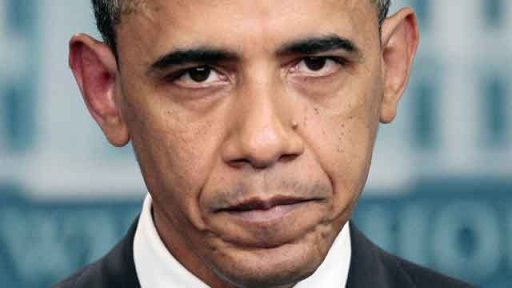
W.H. readies 23 'executive actions'... Developing...Vegas: 60,000 Expected To Attend Gun Show...
Idaho: 'People can hardly walk they've got so much stuff'...
S Dakota: 'Unprecedented demand'...
Kentucky: 'Store shelves bare'...
Virginia: Lines Stretched for Hundreds of Yards...
Citizens File Articles of Impeachment Against Obama...
NRA Ad: President Is 'Elitist Hypocrite'...
W.H. Releases Letters from Pleading Children...
By MICHAEL COOPER, MICHAEL LUO and MICHAEL D. SHEAR
Published: January 15, 2013
A new federal assault weapons ban and background
checks of all gun buyers, which President Obama is expected to propose on
Wednesday, might have done little to prevent the massacre in Newtown, Conn.,
last month. The semiautomatic rifle that Adam Lanza used to shoot 20
schoolchildren and 6 adults complied with Connecticut’s assault weapons ban, the
police said, and he did not buy the gun himself.
But another proposal that Mr. Obama is expected to
make could well have slowed Mr. Lanza’s rampage: banning high-capacity
magazines, like the 30-round magazines that the police said Mr. Lanza used,
which have been factors in several other recent mass shootings.
Those shootings, whose victims have included a member
of Congress in Arizona, moviegoers in Colorado and first graders in Connecticut,
have horrified the country and inspired Washington to embark on the most
extensive re-examination of the nation’s gun laws in a generation. But some of
the proposals that Mr. Obama is expected to make at the White House on
Wednesday, which are likely to include a call for expanded background checks, a
ban on assault weapons and limits on high-capacity clips, will be intended not
only to prevent high-profile mass shootings, but also to curb the more
commonplace gun violence that claims many thousands more lives every year.
“The president has made clear that he intends to take
a comprehensive approach,” Jay Carney, the White House press secretary, said
Tuesday. Mr. Carney said the proposals were aimed, broadly, at what he called
“the scourge of gun violence in this country.”
While semiautomatic rifles were used in several recent
mass shootings, including those in Newtown and in Aurora, Colo., where 12 people
were killed at a movie theater in July, a vast majority of gun murders in the
United States are committed with handguns.
In 2011, 6,220 people were killed by handguns, and 323
by rifles, according to the Federal
Bureau of Investigation. So while the administration is expected to try to
restrict some types of assault weapons, it is also focusing on ways to keep more
commonly used firearms out of the hands of dangerous criminals and people with
mental illness.
Of course, the administration must keep political
realities in mind as it drafts its proposals: getting any new gun regulations
through Congress, particularly through the Republican-controlled House, is seen
as difficult. So the White House must not only weigh the effectiveness of its
proposals, but also their political feasibility.
The top priority of many gun control groups is to
expand the background checks so that they apply to all buyers. All federally
licensed firearms dealers are required to run background checks through the
computerized databases that comprise the National Instant Criminal
Background Check System. But the requirement does not cover guns that are
sold by unlicensed sellers at gun shows and in other private sales, which
account for about 40 percent of gun purchases in the country.
Better background checks would have had little effect
on several recent mass shootings — both Mr. Lanza, in Connecticut, and Jacob T.
Roberts, who opened fire on a mall full of Christmas shoppers a few days earlier
in Clackamas, Ore., were using weapons that they did not buy. But gun control
groups say that expanded background checks would help keep guns out of the hands
of dangerous criminals and people with mental illness, and would go a long way
toward increasing public safety and could help prevent mass shootings.
Gun control groups have encouraged the administration
to look beyond mass shootings. When the Brady Campaign to Prevent Gun Violence,
a leading gun control group, issued its recommendations to Vice President Joseph
R. Biden Jr., who has been developing the administration’s proposals, it urged
him to develop ideas that could help curb everyday gun violence as well.
“Every death is a tragedy, whether in a mass shooting
that horrifies our entire nation, or one of the 32 gun murders or 90 gun deaths
in our communities and homes every day,” it wrote.
With many of the proposals in Washington expected to
be somewhat limited in scope, some public health researchers and gun control
advocates said it was difficult to know what impact the recommendations might
have.















No comments:
Post a Comment